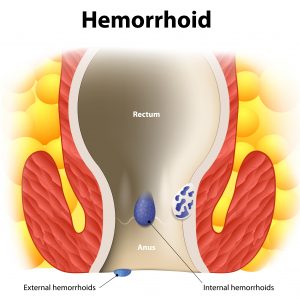 Hemorrhoid Symptoms
Hemorrhoid Symptoms
Hemorrhoids, also called piles, are inflammation or swelling of the veins at or around the anus or rectum, which are normally accompanied by pain or discomfort and bleeding. Hemorrhoids can be caused by chronic constipation and the accompanying straining effort, chronic diarrhea, pregnancy, anal intercourse, obesity and, in some instances, genetics.
Hemorrhoid symptoms include bleeding of the anus when passing stool, difficulty moving out stool, and clots forming inside the anus or around the anal opening. Hemorrhoids can often be evidenced by a visible lump near the anus, which can be painfully sensitive to touch, making bowel movements uncomfortable. Among the many symptoms of hemorrhoids, one of the most common is anal itching, the medical term for which is “pruritus ani”.
Pruritus Ani
Pruritus Ani is a medical condition that refers to a persistent feeling of itchiness in and around the area of the anus. The itch triggers a very strong urge to reach the itchy part and scratch it with your hands or with toilet paper after bowel movements. Constant scratching, even if covered by clothes, may cause damage to the skin that can lead to a skin infection in the area. In addition to the physical factors, scratching of the anus can be very embarrassing and can upset your mood as well as your social mobility and those with you.
Causes of Pruritus Ani
Anal itching can be a symptom of an underlying medical condition. It is possible that, other than hemorrhoids, the itchiness may be caused by skin conditions such as eczema, lichen sclerosus, psoriasis, tumor, or an inflammation caused by allergy or irritation. The inflammation may be due to excessive sweating or repeated cleaning of the anal area or an allergic reaction to an ingredient in soaps and medicines.
Itchy anal skin may also be due to infections such as thrush and fungus, which thrive in warm moist skin areas such as the anus. Other itch-causing infections are threadworms, bacteria, scabies, herpes, warts, and sexually transmitted diseases. It may also be caused by some diseases such as lymphoma, iron deficiency, problems with the thyroids, some liver diseases, and diabetes.
What to Do If You Have Pruritus Ani
Of course, if the itchiness persists, it is best to seek the advice of a qualified medical professional, especially if the cause is unidentified.
In many cases, doctors will prescribe a cream containing hydrocortisone to help to alleviate the itching as well as an anti-fungal ingredient such as clioquinol.
Even without knowing the cause of the itchiness, a proper anal hygiene practice is of utmost importance. where practical you should bath after bowel movements and avoid using harsh, dry toilet paper and soaps containing alcohol and fragrances.
Dermoscribe and Pruritus Ani
Dermoscribe (https://dermoscribe.com/)is dedicated to providing quality products based on proven dermatological formulae recognised around the world for the treatment of a number of common skin problems. It’s Ichybum anal itching cream ideal for the treatement of pruritus ani.
